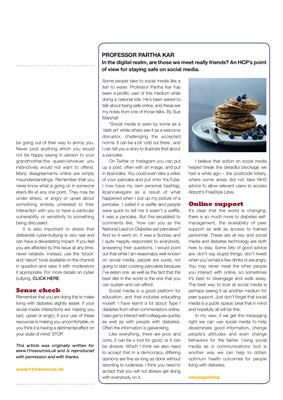
be going out of their way to annoy you.
Never post anything which you would
not be happy saying in person to your
grandmother/the queen/whoever you
instinctively would not want to offend.
Many disagreements online are simply
misunderstandings. Remember that you
never know what is going on in someone
else's life at any one point. They may be
under stress, or angry or upset about
something entirely unrelated to their
interaction with you or have a particular
vulnerability or sensitivity to something
being discussed.
It is also important to stress that
deliberate cyber-bullying is very real and
can have a devastating impact. If you feel
you are affected by this issue at any time,
never retaliate. Instead, use the 'block'
and 'report' tools available on the channel
in question and raise it with moderators
if appropriate. For more details on cyber
bullying, CLICK HERE.
Sense check
Remember that you are doing this to make
living with diabetes slightly easier. If your
social media interactions are making you
sad, upset or angry; if your use of these
resources is making you uncomfortable, or
you think it is having a detrimental effect on
your state of mind: STOP.
This article was originally written for
www.t1resources.uk and is reproduced
with permission and with thanks.
www.t1resources.uk
Some people take to social media like a
fish to water. Professor Partha Kar has
been a prolific user of this medium while
doing a national role. He's been asked to
talk about being safe online, and these are
my notes from one of those talks. By Sue
Marshall
"Social media is seen by some as a
'dark art' while others see it as a welcome
disruptor, challenging the accepted
norms. It can be a bit 'odd out there', and
I can tell you a story to illustrate that about
a pancake.
On Twitter or Instagram you can put
up a post, often with an image, and put
in #pancake. You could even take a video
of your pancake and put onto YouTube.
I now have my own personal hashtag:
#pancakegate as a result of what
happened when I put up my picture of a
pancake. I called it a waffle and people
were quick to tell me it wasn't a waffle,
it was a pancake. But this escalated to
comments like, 'how can you as the
National Lead on Diabetes eat pancakes?
And so it went on. It was a Sunday and
I quite happily responded everybody,
answering their questions. I would point
out that while I am reasonably well-known
on social media, people are surely not
going to start cooking pancakes because
I've eaten one, as well as the fact that the
best diet in the world is the one that you
can sustain and can afford.
Social media is a good platform for
education, and that includes educating
myself. I have learnt a lot about Type I
diabetes from other commentators online.
I also get to interact with colleagues quickly
as well as with people with diabetes.
Often the information is galvanising.
Like everything, there are pros and
cons, it can be a tool for good, or it can
be divisive. Which I think we also need
to accept that in a democracy, differing
opinions are fine as long as done without
resorting to rudeness. I think you need to
accept that you will not always get along
with everybody on it.
I believe that action on social media
helped break the dreadful blockage we
had a while ago - the postcode lottery,
where some areas did not take NHS
advice to allow relevant users to access
Abbott's FreeStyle Libre.
Online support
It's clear that the world is changing;
there is so much more to diabetes selfmanagement, the availability of peer
support as well as access to trained
personnel. These are all key and social
media and diabetes technology are both
here to stay. Some bits of good advice are:
don't say stupid things, don't tweet when
you've had a few drinks or are angry. You
may never meet the other people you
interact with online, so sometimes it's best
to disengage and walk away. the best way
to look at social media is perhaps seeing it
as another medium for peer support. Just
don't forget that social media is a public
space; bear that in mind and hopefully all
will be fine.
In my view, if we get the messaging
right we can use social media to help
disseminate good information, change
people's attitudes and even change
behaviors for the better. Using social
media as a communications tool is
another way we can help to obtain
optimum health outcomes for people
living with diabetes.
nhssugarblog
PROFESSOR PARTHA KAR
In the digital realm, are those we meet really friends? An HCP's point
of view for staying safe on social media.